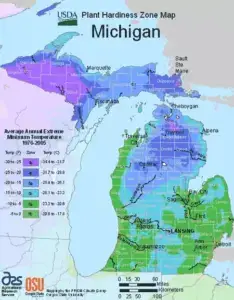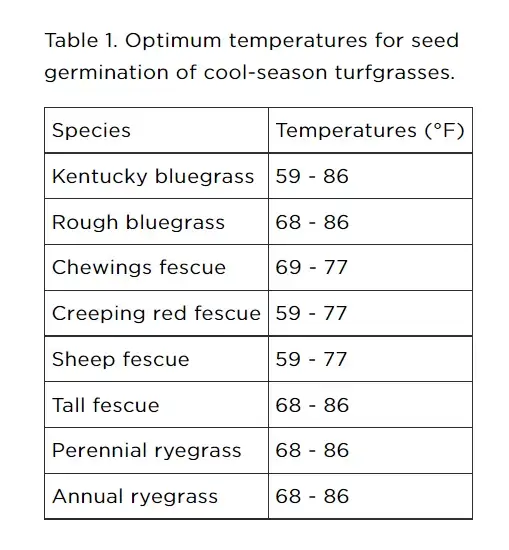Landscaping and lawn service companies breathed a sigh of relief in April last year when they saw restrictions for operations eased. These businesses are playing catch-up to recoup the time lost mowing lawns of their clients in the community.
If another shutdown happens, it may be helpful to know how to keep your existing lawn or garden neat. Beyond simply mowing the lawn, you’ll need to know how to find the right grass seeds to grow and reseed your property with.
This post will introduce homeowners to the basics of choosing the best grass seed to plant and grow on the lawn or garden in Michigan.
What is Michigan’s Climate?
Michigan resides in zones 4a ( as low as -30°F to -25°F) to 6b (as low as -5°F to 0°F). Cities in zones 4a to 5a are located in the northern part of Michigan while zones 5b onwards are located in the southern part.

Source Gardening Know How
Due to its cold climate, cool-season turf grasses are the only grass species that can survive and thrive in Michigan state. At the same time, you can’t just plant any type of cool-season grass in your lawn as not all varieties can withstand the state’s cold temperature especially in the northern area.
Best Lawn Grass Seeds for Michigan
Given the climate in Michigan, the best grasses to grow in the state are cool-season grasses.
The best time to plant cool-season grasses is in late summer: August or early September. In these months, the soil warms up but does not get as hot as it does in summertime. This means that your new lawn’s grass growth will be much faster.

Source: Penn State Extension
Their roots exist in rhizomes (horizontal underground plant stems capable of growing shoots) as opposed to bunching like warm-season ones.
For a homeowner who wants to avoid a summer lawn with bare or thin spots, reseeding thin or bare areas is an option. For best results, plan to reseed by mid-to-late spring after frost warnings are lifted. This is also when soil temperatures reach 50°F or more, and, ideally, hit 60°F for quick germination. Adding moisture can also help ensure successful growth depending on the grass seed type.
Below are the best cool-season grass species for grass growth in Michigan:
Kentucky Bluegrass
Kentucky bluegrass is an excellent choice for Michigan’s lakeshore regions because it grows well in sandy soils. Common types of Kentucky Bluegrass can also be grown successfully across the entire state with its hardiness zones spanning from 2 to 7 and performs best on Michigan lawns that require little care or maintenance.
Fine Fescue
Fine-leafed fescues are best adapted to dry conditions with shade and well-drained soils. These types of grass will not tolerate wet or poorly drained soils. Fine fescue is unlike bluegrass, which requires a lot of maintenance through fertilization or irrigation to avoid thinning in the summer months.
If you have too much water on your fine fescues, they will die off dramatically due to their need for dry weather, intolerance for very moist weather, and damage from fungus from overusing fertilizer.
Perennial Ryegrass
Perennial ryegrass can grow quickly and add depth to Michigan lawns. With a quick germination period, perennial ryegrass can germinate in as few as five days. But, it does not have as much spread as some other grasses without rhizomes or stolons.
During hot and dry conditions, perennial ryegrass requires frequent watering and fertilization at recommended rates. But, perennial ryegrass can make many lawns beautiful.
Tall Fescue
Tall fescue is a tough grass that can handle Michigan’s cold winters, as well as the heat and drought conditions. Tall fescue has deep, winter hardy roots for survival during harsh conditions such as heavy traffic or droughts.
The only downside to using tall fescues in northern regions with harsher winter weather would be its performance while coping with colder climates, since it may not grow back once the snow settles on top of it. But, if you live somewhere in the Lower Michigan area, plant tall fescue as could just be the perfect grass for your lawn.
Rough Bluegrass
The humble and often overlooked rough bluegrass has many unique characteristics that make it a perfect choice for wet, shaded sites without full sun. These grasses grow in extreme shade conditions better than other grass types and thrive in moist soils.
Rough bluegrass does not do well with direct sunlight or traffic since it needs shade. However, it can be found predominantly on golf courses with high foot traffic and shady areas due to its ability to survive under adverse growing conditions.
How to Take Proper Lawn Care in Michigan
Cold-season grass requires proper maintenance for it to grow properly. This is important since the weather won’t be cold forever in Michigan. Not tending to your green lawn, especially during the warmer months of the year, will cause your grass to lose the required nutrients for the plants to grow properly.
To avoid browning, below are steps you must take to take proper care of your grass year long:
Spring
Fertilize your lawn to give it the nutrients it needs to grow back after the winter. Also, get rid of weeds that may start showing up once spring kicks in. Spray weed killers on the infected area or pull them from the roots before they spread further.
Finally, lawns may attract insect problems like pests and mosquitoes once the warmer months of the year kick in. They are harmless to your yard, but you still don’t want them filling up the space during the summer. You can get rid of them using natural methods such as removing freestanding water in your yard or holding a bonfire occasionally.
Summer
Keep your grass well-hydrated under the heat of the sun. Water them every two to three days to ensure that they stay green and healthy. The best time to water grass is in the morning just before the afternoon sun when the temperature is at its highest.
Don’t mow your grass too low. The taller the grass, the cooler the ground under it becomes. This means the grass can retain moisture in the soil longer. So, raise your mow so you don’t make it too short.
Fall
Leaf cleanup should be at the top of the list when taking care of your lawn during the fall. Thankfully, mowing the lawn and mulching the leaves are easy ways to clean up your yard. These techniques can also feed your lawn with the organic material that adds nutrients to the grass and soil.
Cleaning out the gutter is a necessary step to prevent mosquitoes from invading up your lawn. Gutters with freestanding water are due to leaves clogging the drainage, preventing the water from moving down.
These areas are breeding grounds for mosquitoes to lay eggs and multiply. However, cleaning your gutters, however, is as easy as using a ladder to reach out to them and pull the leaves that are clogging your path to the drain.
Winter
During the winter months, it’s important to avoid walking on your lawn and plowing snow onto or near your grass. These actions create a layer of ice and compacted soil that will prevent roots from growing in springtime.
The salt on your driveway can also dry up the moisture in your lawn and make it hard for water to reach its roots. One way you may be able to decrease this is by only putting a little bit of salt down at one time so that some areas don’t have too much while others do not get enough.
These are just some of the basics of the many lawn maintenance tips for the fall and winter.
Conclusion
When it comes to growing Michigan grass seed, you must be wary of different factors. For example, if you want to plant grass seed on property in a nearby lake that has sandy soil, growing Kentucky bluegrass varieties is the best choice. It's a matter of finding the grass types that check all the boxes on your property.
Since not all grasses are the same, you can plant a grass seed mixture well-suited to your region for new lawns. Not only do you get the best qualities of each species, but the blend helps strengthen the soil for more grass to grow. For instance, erosion control blends have a deep root system to help stabilize the slopes in your yard and prevent soil from disappearing.
If you're looking for the best grass seed for Michigan, reach out to us and we'll be happy to help. We'll provide you with suggestions on the best seeds to grow and give you advice on how to properly sustain their growth with fertilizer and proper watering.